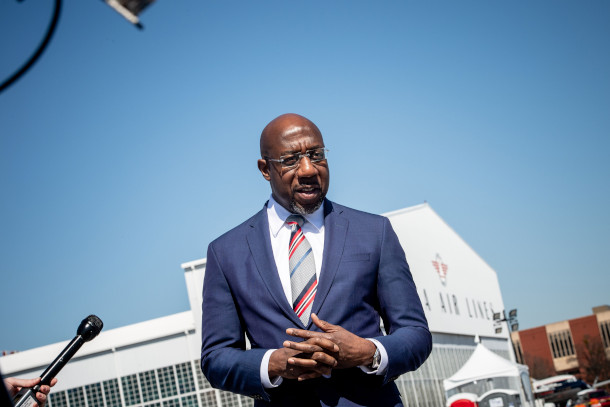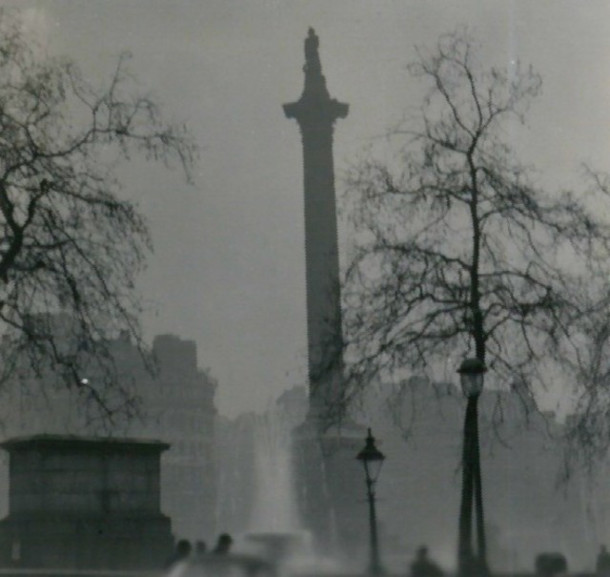Beyond the Headlines
Air Date: Week of December 2, 2022

Raphael Gamaliel Warnock is an American minister and politician serving as the junior United States senator from Georgia since 2021. He is running for reelection as the Democratic candidate for the 2022 Georgia elections. (Photo: Delta News Hub, Flickr, CC BY 2.0)
Environmental Health News weekend editor Peter Dykstra joins Host Steve Curwood to talk about how environmental voters appear to be turning out for the runoff election in Georgia. Then the two discuss concerns around a twenty-six story pig farming building in the Hubei province of China. And for history they recount the 1873 and 1952 killer fogs in London that killed thousands of people.
Transcript
CURWOOD: And I’m Steve Curwood
And on the line with me now from Atlanta, Georgia is Peter Dykstra. Peter is an editor with Environmental Health News that's ehn.org and dailyclimate.org. And hey there, Peter, how are you doing with all those political ads and stuff going on there? The elections over for the rest of us here in the United States, but you've got a hot one right now, huh?
DYKSTRA: That's right, Steve, all over here to except for one race. The last seat in the United States Senate is in a runoff. The election is December 6th. The Democrat incumbent is the Reverend Raphael Warnock. His Republican challenger is the football legend Herschel Walker. They're neck and neck as they were in the general election. We're waiting to see how the runoff works out.
CURWOOD: So there's early voting in Georgian and I understand you've seen some numbers about some of those early voters.
DYKSTRA: Yeah, the Environmental Voter Project took a survey of some of the early voters in the first days down here of early voting. What they call super environmentalists, people who rank the environment and climate change as their most important issue, came to over 20% of early voters. That has to hearten the Democrats who tend to draw the super environmentalist votes and maybe discouraged the Republicans.

Herschel Junior Walker is an American former football running back and the Republican nominee in the 2022 United States Senate election in Georgia. (Photo: Michael Kaplan, Flickr, CC BY 2.0)
CURWOOD: Hey, what else do you have for us today?
DYKSTRA: Well, there's a 26-storey brand spanking new building in Hubei province in China. It's a skyscraper not for people, not for rich folks, not for middle class folks, but it's for pigs. That's 26-storey vertical operation can handle as many as 30,000 pigs a day. It has six large elevators that can move hundreds of pigs from floor to floor at a time. And I can't imagine a vertical slaughterhouse in an urban area is gonna smell very nice.
CURWOOD: It doesn't sound like it's really great for the hogs. I mean, in other words, I suspect there'll be born in that building, and eventually killed in that building with never having been outside and never, never doing what pigs like to do, which is wallow.
DYKSTRA: But they can still stink and they can still spread disease. And in an area with a heavy concentration of humans, having just gone through a horrible pandemic, that's got to be a big concern as well.
China’s 26-storey pig skyscraper ready to slaughter 1 million pigs a year https://t.co/8ti7q9f49W
— The Guardian (@guardian) November 25, 2022
CURWOOD: Yeah, I'm thinking of the swine flu that we've had come and go over the years, it can't help that.
DYKSTRA: Not at all.
CURWOOD: Hey, Peter let's turn out to the annals of history and tell me what you see or smell maybe since we've been talking about those hogs.
DYKSTRA: Well, I guess this is a smelly one, but it certainly hurts the respiratory system, and it did on December 7th, 1873, when a killer fog descended on London. This is the time of year when those notorious London fogs blanket the city as coal use increased, there were coal stoves and just about every home. Those killer fogs included a lot of pollution. In 1873, about 1,000 people are said to have died over the next week. The fog eventually lifted, but many other killer fogs followed in subsequent years. One of the worst was in the first week in December in 1952, when an estimated 4,000 people choked on London's smog fog that also included particulates from diesel buses and diesel trucks, those individual home coal stoves, and coal burning electric power plants. It was a mess that eventually led to some changes.
CURWOOD: So what did the Brits do about this?
DYKSTRA: They actually had a Clean Air Act before the US had a Clean Air Act. It took four years but in 1956, the British or the UK Clean Air Act came into effect, cleaning up some of the urban uses of coal, which eventually began to decline of its own accord and decline over our current concern on climate change.

Nelson's Column a monument in Trafalgar Square in the City of Westminster, Central London during the Great Smog of 1952. (Photo: N.T. Stobbs, Wikimedia Commons, CC BY-SA 2.0)
CURWOOD: Well, thanks, Peter. Peter Dykstra is an editor with Environmental Health News, that's ehn.org and dailyclimate.org. And we'll talk to you again real soon.
DYKSTRA: All right, Steve, thanks a lot. Talk to you soon.
CURWOOD: And there's more on the stories on the Living on Earth webpage that's loe.org.
Links
Follow the Georgia Runoff elections
Learn more about the Environmental Voter Project
Le Monde | “26 Stories of Swine: World's Largest Pig Farm Opens in China”
Living on Earth wants to hear from you!
Living on Earth
62 Calef Highway, Suite 212
Lee, NH 03861
Telephone: 617-287-4121
E-mail: comments@loe.org
Newsletter [Click here]
Donate to Living on Earth!
Living on Earth is an independent media program and relies entirely on contributions from listeners and institutions supporting public service. Please donate now to preserve an independent environmental voice.
NewsletterLiving on Earth offers a weekly delivery of the show's rundown to your mailbox. Sign up for our newsletter today!
 Sailors For The Sea: Be the change you want to sea.
Sailors For The Sea: Be the change you want to sea.
 The Grantham Foundation for the Protection of the Environment: Committed to protecting and improving the health of the global environment.
The Grantham Foundation for the Protection of the Environment: Committed to protecting and improving the health of the global environment.
 Contribute to Living on Earth and receive, as our gift to you, an archival print of one of Mark Seth Lender's extraordinary wildlife photographs. Follow the link to see Mark's current collection of photographs.
Contribute to Living on Earth and receive, as our gift to you, an archival print of one of Mark Seth Lender's extraordinary wildlife photographs. Follow the link to see Mark's current collection of photographs.
 Buy a signed copy of Mark Seth Lender's book Smeagull the Seagull & support Living on Earth
Buy a signed copy of Mark Seth Lender's book Smeagull the Seagull & support Living on Earth

